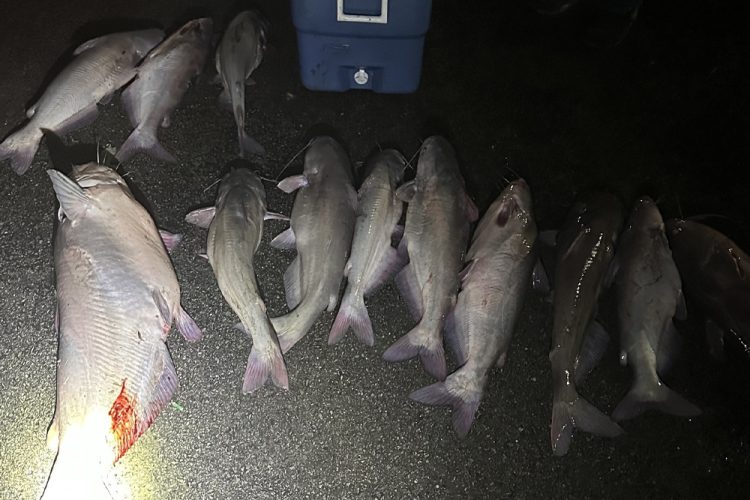Officials say suspects sold thousands of pounds of catfish illegally. (Photo courtesy of KFW Law Enforcement)
Cracking Down on Catfish Trafficking
Source: Kentucky Fish and Wildlife Law Enforcement
Multi-State investigation uncovers illegal commercial catfishing operations.
A multi-agency investigation has led to charges against nine individuals allegedly involved in an illegal commercial catfishing operation that spanned several states, including Kentucky, Alabama and Tennessee. The investigation, spearheaded by Kentucky Fish and Wildlife’s Special Investigations Unit (SIU), uncovered a series of illegal catfish harvests from public waterways, as well as unregulated sales to a pay lake in Glasgow, Kentucky.
Authorities revealed that over 71 separate illegal transactions were made, with thousands of pounds of live catfish harvested from Barren River Lake in Kentucky, a waterway closed to commercial fishing. The fish, many of which were trophy-sized, were allegedly sold to Green Valley Pay Lake, a facility where customers pay to fish in privately stocked waters. The pay-lake operator knowingly purchased the catfish from unlicensed sellers, violating state and federal regulations.
The investigation also revealed that two commercial fishermen harvested approximately 6,400 pounds of live catfish from waters in Alabama, which prohibits the transport of live trophy-sized catfish outside of state lines. Those catfish, some weighing more than 60 pounds, were transported to Kentucky and sold to the same pay-lake operator in Glasgow.
Game Warden Cody Fox, who played a key role in the investigation, explained, “Pay lake operators must follow strict guidelines regarding fish documentation, including where the fish originated and who provided them. In this case, the operator kept no records of the transactions, violating state laws.”
Pay lakes in Kentucky are required by law to document the purchase and stocking of trophy-sized catfish, and there are strict limits on how many fish can be stocked per surface acre of water. In this case, Green Valley Pay Lake failed to keep receipts or meet stocking regulations. According to Fox, “These illegal practices harm public waterways, as catfish removed from their natural habitats often do not survive long in pay lakes, leading to repeated purchases and creating unhealthy fishing environments.”
The investigation was a joint effort involving Kentucky Fish and Wildlife, the U.S. Fish and Wildlife Service, Tennessee Wildlife Resources Agency, Alabama Game and Fish Division and the Barren County Attorney’s Office. In total, the nine individuals face 180 fish- and wildlife-related charges in Kentucky, with additional charges pending in other states.
The penalties for violating pay lake regulations can be severe. First offenses can result in a three-month suspension of a pay-lake operator’s license, while repeat offenses can lead to license revocation for up to two years.
This case highlights the importance of enforcing wildlife protection laws to preserve public waterways and maintain sustainable fishing practices. The investigation serves as a reminder that illegal activities in one state can have far-reaching consequences across multiple jurisdictions.



